 W
WCivil–military relations describes the relationship between civil society as a whole and the military organization or organizations established to protect it. CMR incorporates a diverse, often normative field, which moves within and across management, social science and policy scales. More narrowly, it describes the relationship between the civil authority of a given society and its military authority. "The goal of any state is to harness military professional power to serve vital national security interests, while guarding against the misuse of power that can threaten the well-being of its people." Studies of civil-military relations often rest on a normative assumption that it is preferable to have the ultimate responsibility for a country's strategic decision-making to lie in the hands of the civilian political leadership rather than a military.
 W
WThe Bureau of Political-Military Affairs (PM) is an agency within the United States Department of State that bridges the Department of State with the Department of Defense. It provides policy in the areas of international security, security assistance, military operations, defense strategy and policy, military use of space, and defense trade. It is headed by the Assistant Secretary of State for Political-Military Affairs. Tina Kaidanow currently serves as Acting Assistant Secretary.
 W
WA coup or coup d'état is the removal of an existing government from power, usually through violent means and by usurpers originating from within a country’s institutions. Typically, it is an illegal, unconstitutional seizure of power by a political faction, the military, or a dictator. Many scholars consider a coup d'état successful when the usurpers seize and hold power for at least seven days. A coup attempt may refer to a coup in the works or an unsuccessful coup.
 W
WFeldpost is the German military mail service. Its history dates back to the 18th century in the Kingdom of Prussia during the Seven Years' War and War of the Bavarian Succession and has existed ever since in different forms and shapes.
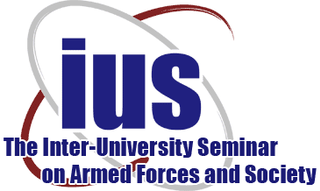 W
WThe Inter-University Seminar on Armed Forces and Society (IUS) is a professional organization and forum for the exchange and evaluation of research on military institutions, civil-military relations, and military sociology with a broad emphasis across the social and behavioral sciences. The IUS is intended to be interdisciplinary in nature and has around 600 fellows in over 35 countries, who hold varying occupations in the military, academia, and the private sector.
 W
WThe Legion of Frontiersmen is a civilian organisation formed in Britain in 1905 by Roger Pocock, a former constable with the North-West Mounted Police and Boer War veteran. Prompted by fears of an impending invasion of Britain and the Empire, the organisation was founded to be a field intelligence corps that would watch over and protect the boundaries of the Empire. Headquartered in London, the Legion of Frontiersmen formed branches throughout the empire to prepare enlistees for war and to foster vigilance in peacetime. Despite persistent efforts, the Legion never achieved any significant official recognition, and is unlikely to ever do so.
 W
WMilitary mail, as opposed to civilian mail, refers to the postal services provided by armed forces that allow serving members to send and receive mail.
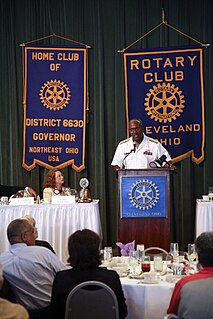 W
WNavy Office of Community Outreach (NAVCO) is the U.S. Navy's Chief of Information (CHINFO) national community outreach field activity.
 W
WNavy Weeks are designed to educate Americans on the importance of Naval service, understand the investment they make in their Navy and to increase awareness in cities which might not otherwise see the Navy at work on a regular basis.
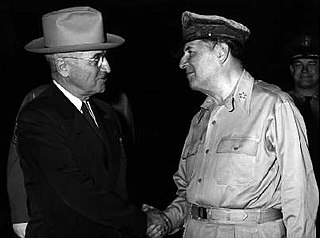 W
WOn 11 April 1951, U.S. President Harry S. Truman relieved General of the Army Douglas MacArthur of his commands after MacArthur made public statements which contradicted the administration's policies. MacArthur was a popular hero of World War II who was then commander of United Nations Command forces fighting in the Korean War, and his relief remains a controversial topic in the field of civil–military relations.
 W
WThe "Revolt of the Admirals" was a policy and funding dispute within the United States government during the Cold War in 1949, involving a number of retired and active-duty United States Navy admirals. These included serving officers Admiral Louis E. Denfeld, Chief of Naval Operations, and Vice Admiral Gerald F. Bogan, as well as Fleet Admirals Chester Nimitz and William Halsey, senior officers in World War II.
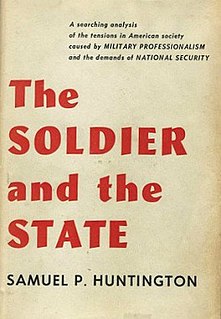 W
WThe Soldier and the State: The Theory and Politics of Civil-Military Relations is a 1957 book written by political scientist Samuel P. Huntington. In the book, Huntington advances the theory of objective civilian control, according to which the optimal means of asserting control over the armed forces is to professionalize them. This is in contrast to subjective control, which involves placing legal and institutional restrictions on the military's autonomy. Edward M. Coffman has written that "[a]nyone seriously interested in American military history has to come to terms with Samuel P. Huntington's The Soldier and the State."
 W
WThe U.S. House Committee on Armed Services, commonly known as the House Armed Services Committee or HASC, is a standing committee of the United States House of Representatives. It is responsible for funding and oversight of the Department of Defense (DoD) and the United States Armed Forces, as well as substantial portions of the Department of Energy.
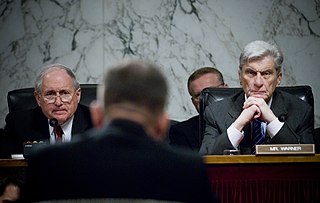 W
WThe Committee on Armed Services is a committee of the United States Senate empowered with legislative oversight of the nation's military, including the Department of Defense, military research and development, nuclear energy, benefits for members of the military, the Selective Service System and other matters related to defense policy. The Armed Services Committee was created as a result of the Legislative Reorganization Act of 1946 following U.S. victory in the Second World War. It merged the responsibilities of the Committee on Naval Affairs and the Committee on Military Affairs.
 W
WRobert A. Vitas is a scholar of civil-military relations, national security strategy, and Lithuania studies. He was an army officer in the U.S. Army Reserve and a visiting scholar at Northwestern University. He is currently the executive director of the Inter-University Seminar on Armed Forces & Society. He is also the chairman of the Lithuanian Research and Studies Center. He received his PhD from Loyola University Chicago and has produced scholarship with other notable civil-military relations scholars such as John Allen Williams and Sam C. Sarkesian.